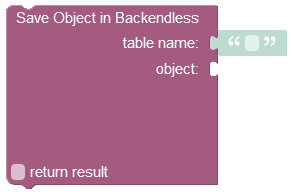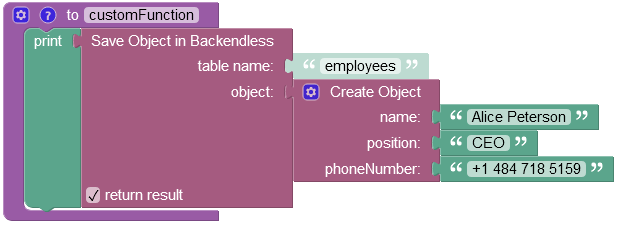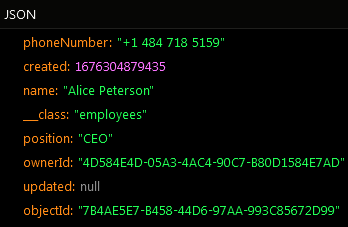Saving Single Object¶
Blocking API¶
public Map Backendless.Data.of( "TABLE-NAME" ).save( Map entity ) throws BackendlessException
public <E> E Backendless.Data.of( E ).save( E entity ) throws BackendlessException
Non-Blocking API¶
public void Backendless.Data.of( "TABLE-NAME" ).save( Map entity, AsyncCallback<Map> responder )
public <E> void Backendless.Data.of( E ).save( E entity, AsyncCallback<E> responder )
where:
| Argument | Description |
|---|---|
TABLE-NAME |
Name of the table where the object represented by |
.util.Map will be saved.
| Argument | Description |
|---|---|
E |
Java class of the data object to save. |
entity |
Java object to persist, must be of type E or java.util.Map (depending on the method used). |
responder |
A responder object which will receive a callback when the method successfully saves the object or if an error occurs. Applies to the asynchronous method only. |
Return Value¶
The synchronous method returns the saved object. The asynchronous call receives the return value through a callback executed on the AsyncCallback object.
Example¶
public void saveNewContact()
{
HashMap contact = new HashMap();
contact.put( "name", "Jack Daniels" );
contact.put( "age", 147 );
contact.put( "phone", "777-777-777" );
contact.put( "title", "Favorites" );
// save object synchronously
Map savedContact = Backendless.Data.of( "Contact" ).save( contact );
// save object asynchronously
Backendless.Data.of( "Contact" ).save( contact, new AsyncCallback<Map>() {
public void handleResponse( Map response )
{
// new Contact instance has been saved
}
public void handleFault( BackendlessFault fault )
{
// an error has occurred, the error code can be retrieved with fault.getCode()
}
});
}
Consider the following class:
package com.sample;
public class Contact
{
private String objectId;
private String name;
private int age;
private String phone;
private String title;
public String getObjectId() {
return objectId;
}
public void setObjectId( String objectId ) {
this.objectId = objectId;
}
public String getName() {
return name;
}
public void setName( String name ) {
this.name = name;
}
public int getAge() {
return age;
}
public void setAge( int age ) {
this.age = age;
}
public String getPhone() {
return phone;
}
public void setPhone( String phone ) {
this.phone = phone;
}
public String getTitle() {
return title;
}
public void setTitle( String title ) {
this.title = title;
}
}
public void saveNewContact()
{
Contact contact = new Contact();
contact.setName( "Jack Daniels" );
contact.setAge( 147 );
contact.setPhone( "777-777-777" );
contact.setTitle( "Favorites" );
// save object synchronously
Contact savedContact = Backendless.Data.of( Contact.class).save( contact );
// save object asynchronously
Backendless.Data.of( Contact.class ).save( contact, new AsyncCallback<Contact>() {
public void handleResponse( Contact response )
{
// new Contact instance has been saved
}
public void handleFault( BackendlessFault fault )
{
// an error has occurred, the error code can be retrieved with fault.getCode()
}
});
}
Codeless Reference¶

where:
| Argument | Description |
|---|---|
table name |
Name of the data table where a new record must be saved. |
object |
An object to save in the database. Object properties must match the names of the table columns. The object must not have the objectId property. |
return result |
Optional parameter. When this box is checked, the operation returns the saved object with the objectId property. |
Returns the saved object with the objectId property assigned by Backendless
Consider the following structure of the data table called employees:
For demonstration purposes, the data table presented above has three custom columns: name, position, and phoneNumber. The objectId is a system column that contains unique identifiers of the records in the table. When a new record is saved to the table, the system assigns a unique objectId to it. The objectid is used in various operations as an access point to a specific record.
The example below saves a new object to the employees data table:

The result of this operation will look as shown below after the Codeless logic runs:

The operation described above has returned the newly saved object:
